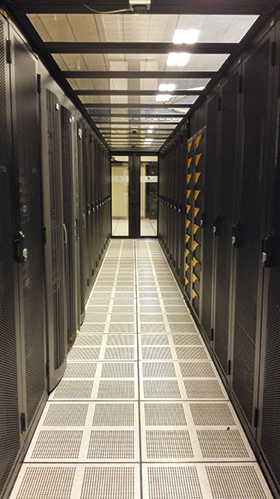

Today’s business landscape is generating information from data centres to the fingertips of employees and customers. This explosion of data and the expectation for immediate decision-making requires networks that can deliver performance, mobility, security and centralised management.
The traditional, on-premises data centre is far from obsolete. For many organisations, data centres will continue to exist on-premises in some form. However, these same companies will opt to establish data centre modernisation by leveraging collocation facilities and the public cloud.
The trend for businesses to own and operate their own data centres has subsided, as collocation and cloud services have become more appealing in recent years. Commercial collocated data centres offer many cost and technology advantages over business-owned facilities, due to the economy of scale.
Why on-premises matters
On-premises data centres are the most predictable and controlled infrastructure to house high-risk assets, such as personal information, medical records and financial information. Hardware that stays on business premises is mainly equipment that is needed to run mission-critical processes. These may require greater management than services currently on offer via the cloud infrastructure.
In an ideal world, enterprises want to choose their preferred venue for each workload and consume resources in the way that best suits them. With the introduction of consumption-based pricing for on-premises infrastructure, organisations pay for data centre hardware based on usage. This allows them to scale up and down as needed, maximising their infrastructure costs while maintaining access to the latest hardware.
The on-premises data centre provides businesses complete control of their in-house hardware and software. For many organisations, being able to maintain, manage and own their own data centre provides several benefits and assurances.
The main reason organisations are opting for the traditional, on-premises data centre is the control, customisation and security it provides. When data is kept on-site and can be secured and monitored effectively, it decreases the chance of data being infiltrated. IT teams are able to customise their data centre in line with the workloads and requirements of the organisation.
To compete in today’s marketplace, all organisations need to leverage cloud applications to a greater or lesser extent. What’s needed is a hybrid approach, a mixture of on-premise and public cloud computing, which incorporates and balances the benefits of both cloud computing and existing on-premise data centres.
The rise of hybrid data centres
Within a hybrid cloud strategy, both public cloud and on-premise elements work in tandem to support the entire range of business needs, bringing about the primary advantage of agility.
Cloud providers are increasingly realising the potential of the hybrid cloud and are developing solutions to make it easier to implement. For example, hybrid cloud frameworks like Azure Stack or AWS Outposts make it possible for organisations to use on-premise servers to run workloads that previously would have been hosted within the public cloud. With the introduction of automated migration and immediate provisioning within software-defined infrastructure, the traditional burdens of data migration have been removed, allowing organisations to move workloads and data with ease.
A hybrid data centre architecture allows your organisation to extend data centres into cloud services. This evolution of the data centre enables flexible scaling for network, storage and compute demand surges. Hybrid data centres offer the best of both worlds: security, performance and reliability with agility, scalability and cost savings across on-premises data centres as well as multiple public, private and hybrid clouds.
With the ever-changing needs of business infrastructure, many organisations trust data centres to play a critical role in meeting their IT requirements. Data centres are now seen as a primary business feature and not only as an external storage facility but for critical information and business applications.
The role of the data centre has never been more important, enabling business continuity with the delivery of remote working tools and cloud-based services. Within Africa, the data centre market investment is expected to reach US$ 5 billion (R75 billion) by 2026, growing at a compounded annual growth rate of 15% from 2021 to 2026.
To support businesses through their digital transformation journey and secure their data needs, Rectron has built partnerships with tier one global brands within the data centre space. With an expanded data centre portfolio, including that of Lenovo Infrastructure Solutions Group (ISG) and cloud services such as Microsoft Azure, Rectron can offer businesses of all sizes the digital technologies needed to accelerate their digital transformation.
Providing the scaleability needed for growth
Today’s economy requires data centres to keep up with the rapid rate of business change and innovation. The truth is that data centres will remain a vital piece of a larger infrastructure puzzle for the foreseeable future. Depending on the organisation’s needs, that puzzle should include on-premise hosting, collocation, Software-as-a-Service offering and cloud computing.
When it comes to scalability, the scope should not just be measured in terms of a data centre’s physical space. With the wealth of data businesses have collected over the years, the ability to scale is a pivotal requirement for modern organisations. Choosing the right data centre facility should complement this today and tomorrow.

© Technews Publishing (Pty) Ltd. | All Rights Reserved.